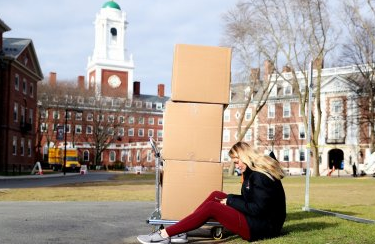Living on Campus During the COVID-19 Pandemic

By Jovana Jovanovska ’23
Staff Writer
On March 16, President Schutt informed the campus community via e-mail that residence halls were closing and students were expected to leave campus as quickly as possible due to the spread of the COVID-19 pandemic. However, as the virus spread to almost every part of the world, international flights were canceled and many countries decided to close their borders. As a result, many international students were unable to return back safely to their homes, and they had no choice but to remain on campus. In these unprecedented times, away from their families and close friends, the international students at Lake Forest College have attempted to remain calm and complete the spring semester.
Stentor staff interviewed some of the international students who remain on campus to get a glimpse of how they are spending their time during the COVID-19 pandemic. Valdrin Halitjaha ’22 is an international student from Kosovo who shared with the Stentor that he has been reading a lot of books in his free time. He noted: “It’s been a while since I’ve had the time to read … when I was younger I did that but once school got tougher I didn’t have a lot of time.”
Similarly, Sadiq W. Dabire ’22 from Ghana said that he now has more time to watch movies and play video games. Some other students use this time to communicate with their friends and family or to learn new skills. Genesis Diaz Lopez ’23 from Guatemala shared that she has spent her time talking to her family and friends from back home, but has also started to meditate in her free time.
When asked what they miss the most from campus before the pandemic, all of the students stated that they miss their friends and social interactions. Gabe Anzeze ’23 from Kenya said he misses being able to interact with people, but something he especially misses is having lunch in the Caf. He shared that dining in the Caf was “one of the best parts of my day because no matter how busy life would get, I would still be able to spend time and have lunch with my friends.” Similarly, Marcin Kopański ’22 from Poland shared that he misses being able to work collaboratively with friends for classes. “I miss approaching every class in group work and talking about our learning experience, we could gather around and talk about classes,” said Kopański.
In regard to online classes, many students stated that the transition has been quite difficult, but they have also acknowledged that there are positive outcomes. Aleksandre Jgarkava ’21 from Georgia said: “It’s kind of hard because it’s fundamentally different from regular classes, however, it’s still manageable. It has its own challenges and definitely takes time to develop habits to do everything by yourself.” Similar concerns were shared by Kopański, who expressed how online classes required him to adjust to a new system. “It took me a while to figure everything out because our learning experience is different from what it used to be. It requires a lot of independent input, so I see a lot of advantages to that.”
Each one of the students expressed that Lake Forest College has put a lot of effort into making their stay and the transition as comfortable as possible. “I’m positively surprised how the school is handling the situation because there are some institutions where they asked students to leave, while here they allow us to stay and they are providing everything that we need in this situation … we don’t even need to go out to get groceries because we have everything here,” said Jgarkava. In addition, Anzeze shared: “The school has given enough support … they have given us everything we need to stay safe and move as little as possible … I think the school has been really good at taking care [of us].”
Although they are unsure of what will happen after the semester is over, international students, including myself, have used this time to adjust to the new way our semester and our summer plans have changed as a result of the COVID-19 pandemic. With the support of the College, our families and peers, the transition has been comfortable and allowed us to feel safe even on a mostly empty campus.